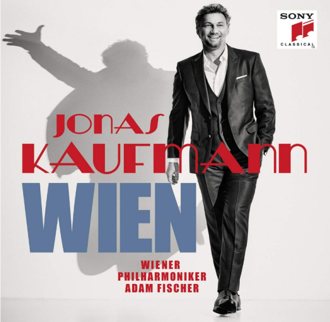|
Jonas Kaufmann impresses with his finely judged
phrasing, psychological acuity and seductive swagger
|
|
|
|
|
|
Gramophone, 01/01/2020 |
| Edward Seckerson
|
|
|
|
‘WIEN’ – JONAS KAUFMANN, RACHEL WILLIS-SØRENSON,
VIENNA PHILHARMONIC/FISCHER |
|
|

If you’re watching the calories, stop reading now. This
evocative collection of Viennese sweetmeats, of wine, women,
song and Sachertorte, does not countenance the notion of
abstinence. Kaufmann’s love affair with Vienna – City of Dreams
– was born in the Tyrol (his grandparents’ farm) and carried
through to operatic stardom. His first professional production
was an operetta – Strauss’ A Night in Venice – and he embraces
the style, the timbre, the allure, even the specific accent of
this repertoire with complete conviction and self-evident
delight.
The great thing about these performances is that
they sound ‘lived in’. The trick in performing Viennese operetta
and Viennese chansons (and this selection has been shrewdly
chosen caress both) is surely that they don’t sound ‘artful’ but
rather that the impression is of them slipping off the vocal
chords, spontaneous, relaxed and over-easy. The range here is
from numbers born into a cabaret style like Hans May’s ‘Heute
its Der schönste Tag in mine Leben’ and Hermann Leopoldi’s ‘In
einem kleinen Cafe in Hernals’ (where Kaufmann might be enjoying
a slice of Kardinalschnitte) to the full tenurial voluptuousness
of the Korngold version of ‘Sei mir Gergrüsst du holds Venezia’
from Strauss’ A Night in Venice and ‘Zwei Märchenaugen’ from
Kalman’s Die Zirkusprinzessin (The Circus Princess) which abound
in zigeuner heat and is described by Kaufmann as operetta’s
answer to I Pagliacci’s Canio. It’s in numbers like this where
one forgets that maybe there were fine details that Kaufmann
might have finessed more deftly a few years back and one is
eternally grateful for his beefy, darkening tone.
There
is so much to savour here – but above all it’s the stylistic
understanding (and in this experience and hindsight are
invaluable) that carries all before it. There is a oneness, too,
with his collaborators – Adam Fischer and the inimitable Vienna
Philharmonic, their oft-swooning strings festooning the voice in
Robert Stolz’s utterly gorgeous ‘Im Prater blahs winder die
Bäume’. I love too Carl Zeller’s ‘Schenkt man such Rosen in
Tirol’ with its super-catchy chorus and Weinberger’s ‘Du Wärst
für mich die Frau Gewesen’ where Kaufmann’s seductive head-voice
is sexily shadowed by solo violin. By contrast we are in darker
Kurt Weillian territory with the despondent really bitter-sweet
Hans May number ‘Es word im Leben dir meh genome all gegeben’.
Oh, and fear not, Lehar’s Widow waltzes in (along with
soprano Rachel Willis-Sorenson) for ‘Lippen Schweigen’ – one of
the very great tunes, one for the ages – all ages.
|
|
|
|
|
|
|
|
|
|
|
|
|
|
|